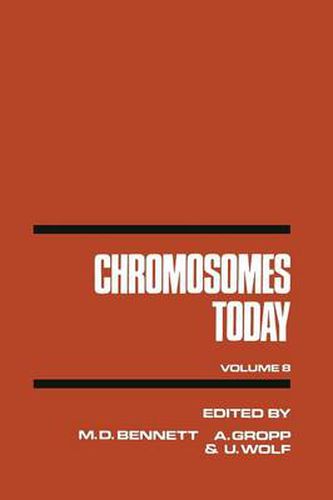Readings Newsletter
Become a Readings Member to make your shopping experience even easier.
Sign in or sign up for free!
You’re not far away from qualifying for FREE standard shipping within Australia
You’ve qualified for FREE standard shipping within Australia
The cart is loading…






This title is printed to order. This book may have been self-published. If so, we cannot guarantee the quality of the content. In the main most books will have gone through the editing process however some may not. We therefore suggest that you be aware of this before ordering this book. If in doubt check either the author or publisher’s details as we are unable to accept any returns unless they are faulty. Please contact us if you have any questions.
The first Oxford Chromosome Conference, as many will know, was organised by C. D. Darlington and K. R, Lewis and held in the Botany School in July, 1964. Its purpose was to bring together a repres entative international group of those concerned with the study of chromosomes, whatever their organism, methods and objective, in the confident expectation that all would profit by learning about the interests, ideas and discoveries of others whose work might other wise not come to their attention. No similar gathering had been attempted before; because of the wide range of biological cont exts in which chromosome study is relevent, spoken accounts of new research were scattered over many different meetings (and written reports over even more different periodicals). At the time of the first Conference the mechanics of trans mission and recombination were, of course, already well understood in their essential features, although a cloud of mystery still hung over the basis of spindle function and the nature of the centromere. At that time also chromosome study had long been est ablished as a valuable aid to the taxonomist and student of evolu tion on the one hand and the plant breeder on the other. But the new sophistication in the use of biochemical and biophysical methods had only just started to make its impact on our knowledge of chromosome organisation and behaviour.
$9.00 standard shipping within Australia
FREE standard shipping within Australia for orders over $100.00
Express & International shipping calculated at checkout
This title is printed to order. This book may have been self-published. If so, we cannot guarantee the quality of the content. In the main most books will have gone through the editing process however some may not. We therefore suggest that you be aware of this before ordering this book. If in doubt check either the author or publisher’s details as we are unable to accept any returns unless they are faulty. Please contact us if you have any questions.
The first Oxford Chromosome Conference, as many will know, was organised by C. D. Darlington and K. R, Lewis and held in the Botany School in July, 1964. Its purpose was to bring together a repres entative international group of those concerned with the study of chromosomes, whatever their organism, methods and objective, in the confident expectation that all would profit by learning about the interests, ideas and discoveries of others whose work might other wise not come to their attention. No similar gathering had been attempted before; because of the wide range of biological cont exts in which chromosome study is relevent, spoken accounts of new research were scattered over many different meetings (and written reports over even more different periodicals). At the time of the first Conference the mechanics of trans mission and recombination were, of course, already well understood in their essential features, although a cloud of mystery still hung over the basis of spindle function and the nature of the centromere. At that time also chromosome study had long been est ablished as a valuable aid to the taxonomist and student of evolu tion on the one hand and the plant breeder on the other. But the new sophistication in the use of biochemical and biophysical methods had only just started to make its impact on our knowledge of chromosome organisation and behaviour.